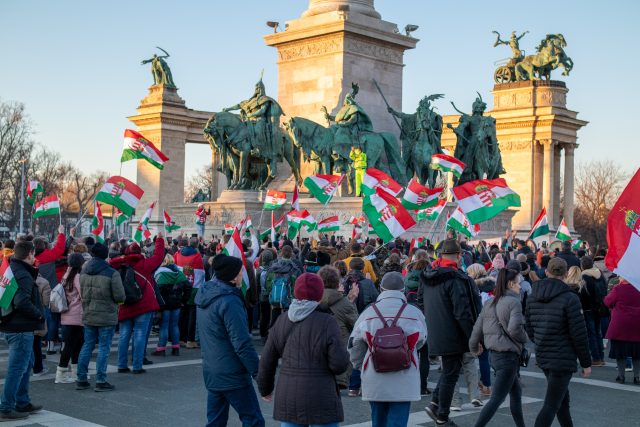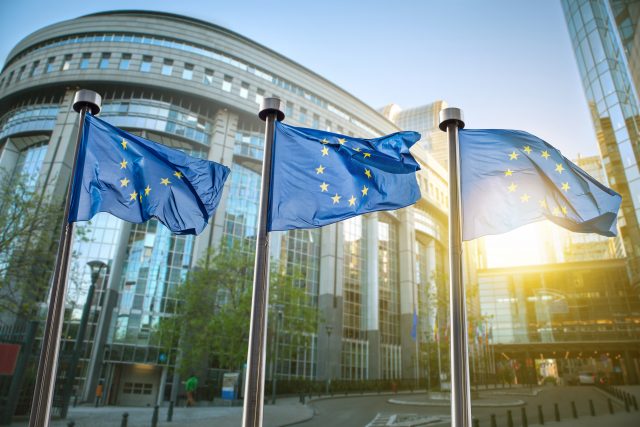The assumptions that have long underpinned the European Union’s development and institutional mindset have continued to fall one after another in the early months of 2022.
The European Union’s development has been predicated on several crucial assumptions:
- Members of the European Union would not seek to leave the Union or abandon hard-earned tenets of liberal democracy.
- The European Union’s regulatory power would attract member states toward the EU’s liberal values.
- The European Union could achieve peace through trade with autocracies and eventually shape those countries toward more democratic norms.
Recent events have put each of these assumptions to the test. The European Union is no longer absorbing others into its values. Its central challenge is to hold the line against eroding democratic values, both in its immediate neighborhood and in its own ranks.
The European Union is no longer absorbing others into its values. Its central challenge is to hold the line against eroding democratic values, both in its immediate neighborhood and in its own ranks.

Hungary Prime Minister Viktor Orbán’s latest landslide victory portends another four years of ‘illiberal democracy’ within the heart of the European Union. Orbán’s statements in the aftermath of his victory labeling even Ukrainian President Volodymyr Zelensky as an ‘opponent’ foreshadow a particularly difficult coming four years between the European Union and Hungary. The stage is set for conflict on the issue of billions of Euros of Recovery and Resilience payments to Hungary, further economic sanctions on Russia, media freedom, corruption, and support for Ukraine. The elections in Hungary show that it can no longer be assumed that members of the EU will stay members of the Union, or stay faithful adherents to its values.
The re-election of Aleksandar Vučić as President of Serbia further highlights the challenge to Europe’s influence in the Western Balkans. Serbia has long sought to balance its stated aspirations to join the EU with its economic and strategic ties to Russia and China, a topic CIPE has studied through its research on corrosive capital. As Russia’s war on Ukraine redefines global geopolitics, Vučić will find it increasingly difficult to balance these competing priorities. Yet, Brussels, too, will find the attraction of EU accession undercut by Russia and China’s growing influence in the region, as alternative powers offer investment without difficult demands for governance reforms. As the EU’s ambitions to take on new members from the Western Balkans stalled in recent years, it also lost influence in shaping the democratic trajectory of the region.
The European Union will need to have a much better understanding of local political and economic realities in member states in order to restore momentum to liberal democracy.
Finally, the gut-wrenching images of Russian atrocities in Bucha, a suburb of Kiev, have raised the pressure on EU member states to further tighten sanctions against Russia, including banning imports of Russian oil and gas. Russia’s aggression in Ukraine has finally slayed the lazy European assumption that economic ties with authoritarians could somehow keep the peace and perhaps even transform autocracies into democracies. The only question now is how many more gruesome images it will take for EU member states to agree to tougher economic sanctions on oil and gas that might undercut the of millions of Euros each day that finance Russia’s war machine. For the time being, it appears that many across Europe see oil and gas sanctions as a cost too high to bear for their own economies. An even more uncomfortable question that lurks over Europe is what lessons it can and should learn from the Ukraine crisis about its economic dependency with China, Europe’s largest trading partner.
As these assumptions fall by the wayside, Europe will need to revisit its assumptions, as well as its tactics for promoting democracy in the region. Two urgent priorities come to mind:
 First, the European Union will need to have a much better understanding of local political and economic realities in member states in order to restore momentum to liberal democracy in Central Europe. Gerrymandering, lack of media freedom, and huge disparities in campaign spending gave Orbán’s Fidesz party enormous structural advantages in last weekend’s elections. But the fact of the matter is that Orbán’s government enjoys real support in the country, particularly in rural areas. Understanding the voices, motivations, and concerns of citizens and business leaders outside national capitals will be crucial to revitalizing liberal democracy in the region in a manner consistent with the wishes of the European Union.
First, the European Union will need to have a much better understanding of local political and economic realities in member states in order to restore momentum to liberal democracy in Central Europe. Gerrymandering, lack of media freedom, and huge disparities in campaign spending gave Orbán’s Fidesz party enormous structural advantages in last weekend’s elections. But the fact of the matter is that Orbán’s government enjoys real support in the country, particularly in rural areas. Understanding the voices, motivations, and concerns of citizens and business leaders outside national capitals will be crucial to revitalizing liberal democracy in the region in a manner consistent with the wishes of the European Union.
Rather than thinking that trade will shape autocracies, the European Union needs to take more aggressive steps to protect its own democracies from exploitation of and dependency on autocracies.
Second, rather than thinking that trade will shape autocracies, the European Union needs to take more aggressive steps to protect its own democracies from exploitation of and dependency on autocracies. Prior to Russia’s attack on Ukraine, the focus of the EU was largely on China’s attempt to coerce Lithuania to drop its growing political and economic linkages to Taiwan. The European Commission’s move to develop a robust Anti-Coercion Instrument is a crucial step for Europe to protect its democratic security, but it is not enough. More difficult decisions lie ahead regarding remaking Europe’s energy mix, reducing dependency on China for raw materials and semi-conductors, and strengthening investment screening in the EU’s more fragile states like Cyprus, Bulgaria, and Croatia.
The early months of 2022 have continued to shatter the assumptions that have long underpinned the European project. Fortunately, a growing number of political and business leaders are coming to grips with this reality, but the Union is still far from consensus regarding the full scale of reforms required to adjust to Europe’s new democratic realities.
Published Date: April 07, 2022